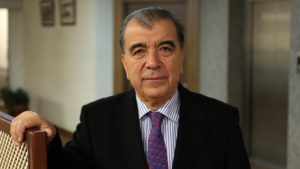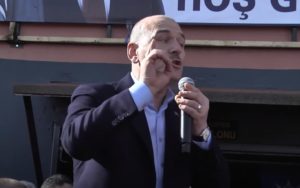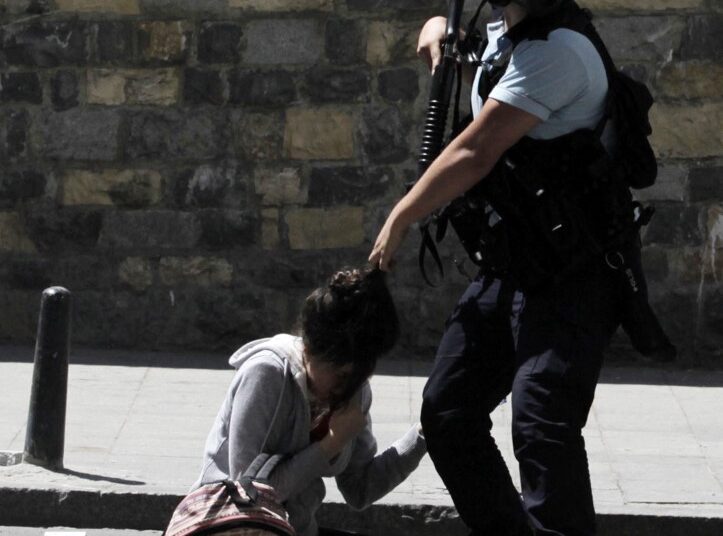Abdullah Bozkurt/Stockholm
A retired veteran intelligence officer and a leading Russia expert revealed that the the government of President Recep Tayyip Erdogan asked him to level baseless accusations against Germany and opposition politicians in Turkey in exchange for his release from jail, where he was wrongfully imprisoned.
Testifying at a hearing at the Ankara 28th High Criminal Court in February, Enver Altaylı, who had worked for Turkey’s National Intelligence Organization (MIT) in the ’60s and ’70s, said his captors asked him to level accusations against Germany and say Berlin was behind the 2013 anti-government protests in Turkey.
“In 2017, they unlawfully questioned me in detention and offered me my freedom in exchange for making statements against the German state. I have a witnesses [to this]. They said, ‘Mr. Enver, you are a hero. We know that. Germany instigated the Gezi events [2013 anti-government protests]. It’s going to provoke incidents like this again,” Altaylı told the panel of judges.
He listed the first names of the police who had been in the room when the offer was made as Aydemir, Mahmut and their chief Abdülkadir.
“[They said] ‘Sir, you are an intelligence officer. You know Germany and Germans well. Tell us how the Germans will stir up trouble in Turkey again, and we will declare you a hero. … You will be set free.’ I said, ‘How can you expect me to lie? I couldn’t slander either a person or a country,” Altaylı said in recalling the conversation that took place in the room.
Enver Altaylı’s court testimony that revealed a plot by the Turkish government against Germany:
After he rejected the offer, he was kept in solitary confinement for months. The 78-year-old Altaylı was close to death since he had sustained a brain hemorrhage.
After leaving the agency, Altaylı had settled in Germany, where his daughter lived and ran a dental clinic. He acquired German citizenship as well during the years he lived there.
The 2013 Gezi Park protests erupted following Erdogan’s highly disputed decision to built a shopping mall in the form of an Ottoman-era barracks in İstanbul’s centrally located Gezi Park. The government resorted to a heavy-handed crackdown on protesters during the ensuing demonstrations, which began as a sit-in against plans to demolish a city park and quickly turned into massive anti-government protests across Turkey.
Erdogan blamed the demonstration on a foreign conspiracy to oust him from power. Nordic Monitor published documents in 2019 revealing how Erdogan secretly ordered the intelligence service to spy on German foundations in Turkey.
The pressure on Altaylı continued in prison. After a long period of solitary confinement, another deal was offered him several times by prosecutor Muhammed Ali Çalışkan, who said agents from MIT would like to visit him and cut a deal so that he could be released. “Mr. Enver will have no problems. It’s all going to be over. But they [MIT agents] will have some requests from him. They want to work with him,” read the message conveyed to Altaylı through the office of public prosecutor Çalışkan.
Altaylı said the deal this time included slandering opposition politicians in Turkey. He said he rejected the deal and that his lawyer, Adem Eroglu, was a witness to this message from the public prosecutor.

Altaylı’s revelations during the court hearing confirm that a secret plan has been underway for some time to build a narrative of alleged German interference in domestic Turkish politics in order to float conspiracy theories, undermine the opposition and smear Erdogan’s opponents. Since last week, Erdogan government officials have been busy peddling conspiracy theories and espionage charges against Germany ahead of the May 14 elections.
Appearing on half a dozen Turkish networks in recent days, Interior Minister Süleyman Soylu claimed he had an audio recording from the German embassy where an opposition politician and German diplomats were discussing opposition election strategy. He did not say how he obtained the audio recording of the talks held behind closed doors but accused the German embassy and the opposition of engaging in spying.
According to Soylu, deputy chairman of the main opposition Republican People’s Party (CHP) and former ambassador Ünal Çeviköz met with German officials at the embassy some time last year to coordinate election and post-election strategy.
Asked how he obtained the audio recording, Soylu said, “If someone is engaged in espionage, it is Turkey’s obligation to monitor the activities. … I listened to the audio recording. It wasn’t just a matter of paying a [courtesy] call at [the German embassy].”

“The meetings are part of espionage activities, and the [Turkish] state has records [of these meetings],” Soylu added.
The interior minister further noted that he raised the matter with visiting German Interior Minister Nancy Faeser during her visit to Turkey in November 2022 and claimed that she did not ask how Turkey managed to obtain an audio recording of a conversation at the embassy.
This is not the first time Soylu has made these claims. Speaking to a group of supporters in Aydın province in May 2022, he cited excerpts from the transcript of a closed-door meeting of an opposition politician at a Western embassy without naming the politician or the embassy. This time he went further by identifying the politician and the embassy.
In response to the allegations, CHP parliamentary group deputy chairman Engin Özkoç said he had talked to Çeviköz and learned that he would be filing a legal complaint against the minister.
In the meantime, Altaylı continues to remain in prison as of today on baseless charges. He believes his decades of work against Russia in Central Asia made him an enemy of Moscow and that pro-Russian factions in the Turkish government are punishing him by keeping him in jail.












